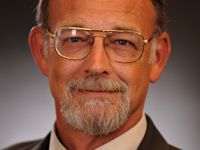Humanity
Posted: May 21, 2010
Doing what matters
His desk is piled with student papers and nothing but student papers.
His passion? Helping to create a new generation of physicians who will put humanity back in medicine.
For Thomas Bennett, D.O., a course director and founding member of the School of Osteopathic Medicine in Arizona, the humanitarian aspect of medicine enables doctors to touch patients’ lives positively, to instill compassionate, patient-centered values in medical students, and to transform the way medicine is taught and practiced.
Having worked in rural Arizona, including Apache County where he was one of just three physicians serving a huge swathe of desert land, Dr. Bennett has seen what happens to people when they don’t get proper access to healthcare, and that fuels his passion for caring for the underserved.
SOMA shares this same mission, which is why he gives to the school.
“The whole idea of SOMA is giving back and caring for people,” he says. “In this current health debate, providers of healthcare should have a little more of the attitude of taking care of people in need and doing so in a culturally competent manner.”
On a personal level, “complete selfishness” motivates Dr. Bennett to give back to SOMA because he wants to train the best physicians possible, especially in view of the fact that they will be his healthcare providers in the future.
Because medical education is expensive, he says giving to the school makes him feel he has done something that matters. “What I do is a small thing,” he says, “and if many people do small things like this we can provide our students greater opportunities to care for people in need.”
According to Dr. Bennett, SOMA wants to produce primary care physicians and generalists who understand what happens when people don’t have access to healthcare.
“We are trying to live it in front of them so that they understand the humanity of medicine.”
Dr. Bennett believes that most SOMA students, because of their use of the Clinical Presentation Model, small-group learning, and early clinical experience in community health centers, will exhibit empathy and cultural competency in dealing with a diverse patient population.
“Medicine needs to be personal,” he says. “We need to put the humanity back into medicine.”